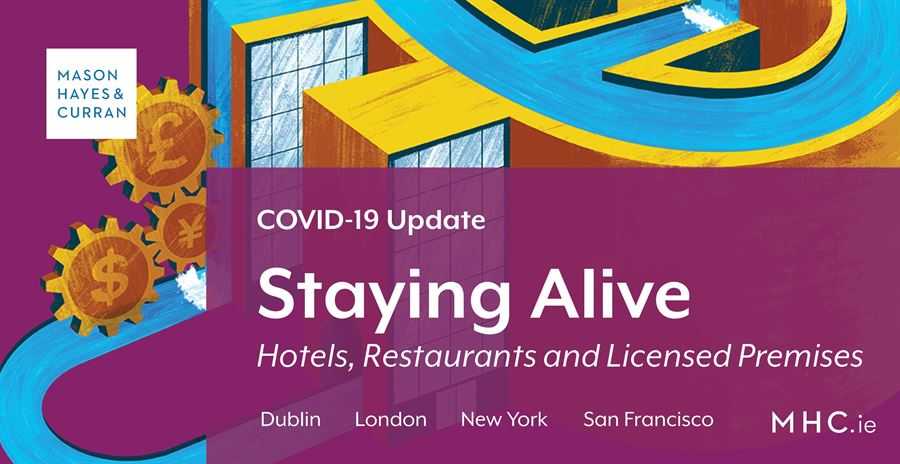COVID-19: Staying Alive – Hotels, Restaurants and Licensed Premises

Following the recent introduction of emergency measures, the owners and operators of hotels, pubs, restaurants and licensed premises have been left with little or no option but to stop trading. This has had a deep effect on their businesses and while these measures are understood as necessary to slow the spread of COVID-19, it has had a considerable impact on these businesses.
But what can these owners and operators do now to try and keep their businesses alive?
Commercial rates deferral - contact your local authority
The Government has from 20 March 2020 agreed with local authorities to permit the deferral of rates payments due from the most immediately affected businesses - primarily in the hospitality, retail, leisure and childcare sectors, for three months until the end of May. This measure will be implemented by each local authority in its own area.
Any commercial ratepayers that have had to temporarily close or significantly curtail operations during the COVID-19 response period should contact their local authority immediately about any rates payments falling due between now and the end of May (which may be extended by the Minister).
Business Interruption Insurance – check your policy
Check your insurance policy to confirm if you are insured for business interruption cover and contact your broker or insurer to discuss your ability to make a claim.
The Central Bank of Ireland (CBI) recently set out its expectations of how regulated insurance firms should treat their customers in light of the significant disruption caused by COVID-19. The CBI is of the view that that the recent Government advice to close businesses should be treated as a direction and the ability to claim under any insurance policy should be reviewed in this context. This is a view that has also been set out by the Minister for Finance, Public Expenditure and Reform. Firms must ensure that claims are appropriately assessed and where there is insurance cover in place those claims are accepted and paid promptly.
In addition, insurers must be confident that they are fully compliant with the CBI’s Consumer Protection Code 2012. Any claim settlement offer made to a claimant must be fair, must take into account all relevant factors and must represent the firm’s best estimate of the claimant’s reasonable entitlement under the policy. While the CBI expects that most policies are clear in terms of what cover is provided and what is excluded, where there is a doubt about the meaning of a term, the interpretation most favourable to the consumer should prevail.
In summary, the above should be flagged to an insurer where claims are being denied and you believe the above principles are not being adhered to.
New ways to trade – changes to planning law
Minister Eoghan Murphy has introduced new regulations amending planning law to permit restaurants and cafés, who do not trade as takeaways due to planning restrictions, to now provide takeaway and delivery services without the need to apply for a change to their planning permission.
These regulations have been brought in to allow restaurants, cafes and other food businesses continue to trade while allowing for social distancing without the need for customers on site. The obligation to trade only within certain hours permitted by their planning permission has also been relaxed to facilitate this.
Hotels are also finding new ways to stay open and assist with the battle against COVID-19. The Citywest Hotel will be the first of a number of isolation locations that will be made available across the country. Citywest will house 750 beds for people who have tested positive but don’t require hospitalisation and cannot isolate at home. Minster for Health, Simon Harris has said that Citywest and other hotels coming available is ‘progress’ that will ‘provide hundreds of isolation rooms and step down facilities’. Potential opportunities for hoteliers to stay open and assist in providing a vital service to the community should be fully considered. Examples such as this could result in certain hotels being reclassified as providing Essential Services in accordance with the recent guidelines and potentially be allowed to stay open.
Revisit your supplier contracts
Take the time to review the provisions of contracts entered into with suppliers with a view to varying the terms going forward by mutual agreement, or otherwise. As ever, you may wish to consider seeking expert legal advice when reviewing and/or attempting the vary the terms of your contracts. You should also discuss with your accountant or financial advisor the ability to defer the payment of VAT due on any goods and services and to seek refunds of VAT due as a matter of urgency from the Revenue Commissioners, where applicable. Keeping costs down to a minimum will be crucial to maintain cashflow.
Refund on stamp duty for late exemptions
Where you have applied for and obtained special exemption orders to allow you trade late for any particular month, an application can be made to your local District Court for a refund of the stamp duty or a deferral of the exemption to the rescheduled date.
These are just some of the measures introduced. Additional assistance is available in certain circumstances including Fáilte Ireland grants etc. For full details see the following websites here and here.
Comment
The Hotels, Restaurants and Licensed Trade sectors are fundamental to the economy and to maintain healthy levels of employment. A recent PwC report confirmed that the hospitality sector payroll provides a weekly contribution to the Irish economy of €87.7 million.
The Government in conjunction with lenders should consider ways to offer new measures and financial packages to businesses in this sector – whether by interest free loans or otherwise. There are also strong arguments to reduce the VAT rate for 2020 and extend the rates deferral scheme to 12 months.
All parties involved must consider new and innovative ways to keep businesses alive. Restaurants and cafes providing delivery services and hoteliers using their premises as facilities for isolation are just some examples of how this can be done. More Government backed support is needed and will hopefully be brought in to help businesses stay afloat in the short term.
For further advice please contact a member of our Food, Agriculture & Beverage or Real Estate teams.
The content of this article is provided for information purposes only and does not constitute legal or other advice.
Share this:

